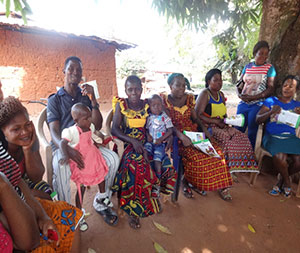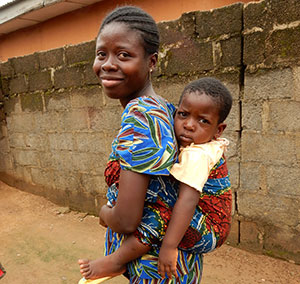A Community Volunteer's Story

From Skeptic to Nutrition Champion
A community volunteer in Eror, a remote area of Nigeria’s Edo State, Mary Ohamije was skeptical at first about the value of community-based infant and young child feeding (C-IYCF). In June 2014, she attended a three-day training on the topic even though she felt that she had nothing new to learn about feeding babies. At the time, she was pregnant with her fourth child and planned to feed her new infant a mix of breastmilk and other liquids and foods the way she had with her first three children. Although Mary was wary of being told what to do by a government-sanctioned program, she was pleasantly surprised by what she learned.
Mary now knows not to give a baby any food or drink other than breastmilk (not even water) for the first six months. She learned the value of “first milk,” or colostrum, to a baby’s development and how to express breast milk by hand (manually) and keep it sanitary for safe feeding later.
The SPRING C-IYCF training has helped me a lot. The things I learned worked for my baby and me. Today I now know that the IYCF training was for the greater good of my baby.
--Mary, Osobgon’s mother and a community volunteer
Rollout of the C-IYCF Package

Funded by USAID, SPRING promotes improved nutrition practices and access to quality nutrition services in Nigeria through the rollout of the Nigeria Community-Based Infant and Young Child Feeding Package. The rollout, which depends on community volunteers like Mary for its success, seeks to increase the adoption of optimal nutrition practices for infants and young children as a way to reduce stunting and malnutrition in the country. Highly motivated C-IYCF support group leaders like Mary complete a series of technical trainings that equip them to teach caregivers proper infant and young child nutrition and hygiene. They lead support group meetings, typically once a month or every two weeks, with 12-15 community members—including fathers, mothers-in-law, and other caregivers, as well as mothers—to talk about IYCF practices.
Practicing What She Teaches
When Mary’s baby, Osogbon (“the new phenomenon”), was born, she decided to apply the knowledge that she had gained about IYCF to feeding her own child. She says, “It is a source of joy and relief knowing that my husband can feed my baby with my expressed breast milk as well as spending less on baby food and drugs. My baby is growing well and is very healthy. Our incomes have increased as we have had no reason to buy drugs or go to the hospital for treatment of common child diseases.”
Mary and her husband continue to educate other households, particularly those with women of reproductive age, about the importance of exclusive breastfeeding. She remains an active member of Omokhodion (“the child comes first”) C-IYCF Support Group in Eror so that she can help other women benefit from this SPRING-facilitated initiative to improve lives by improving nutrition.